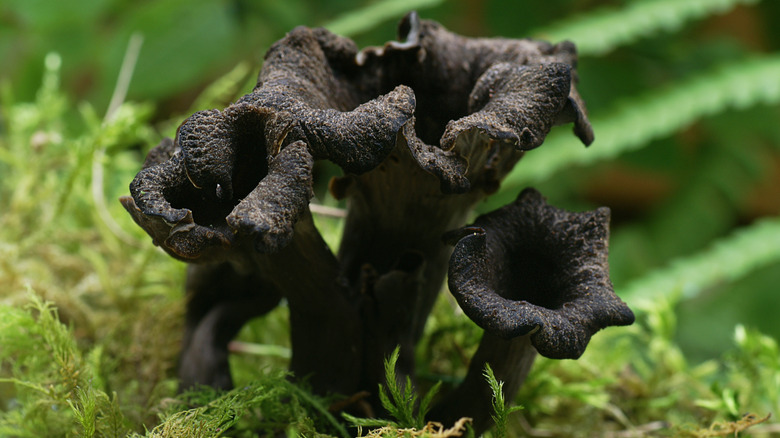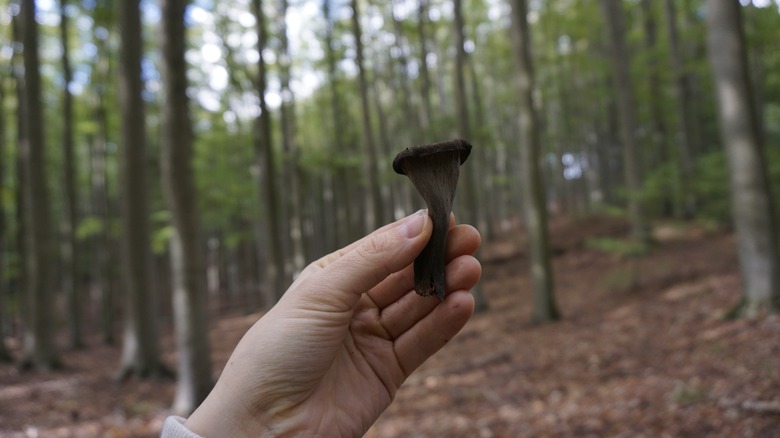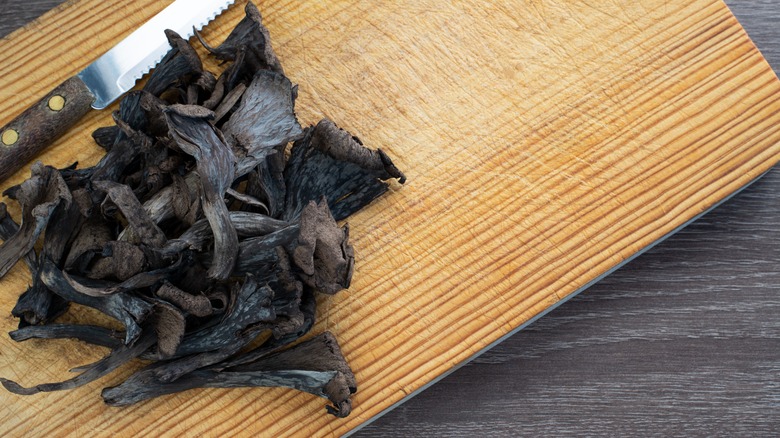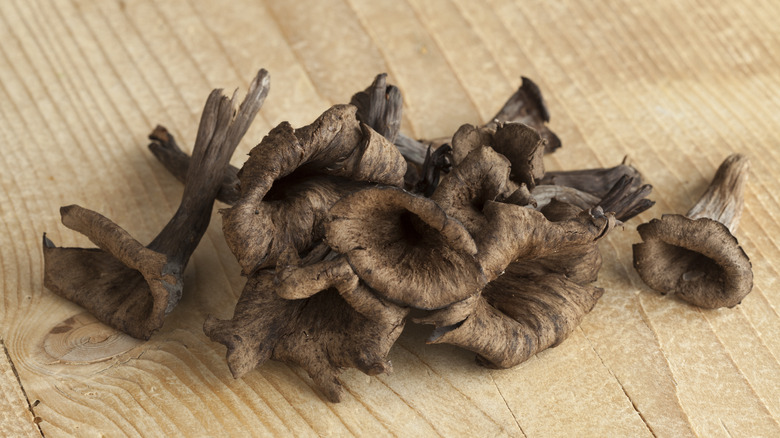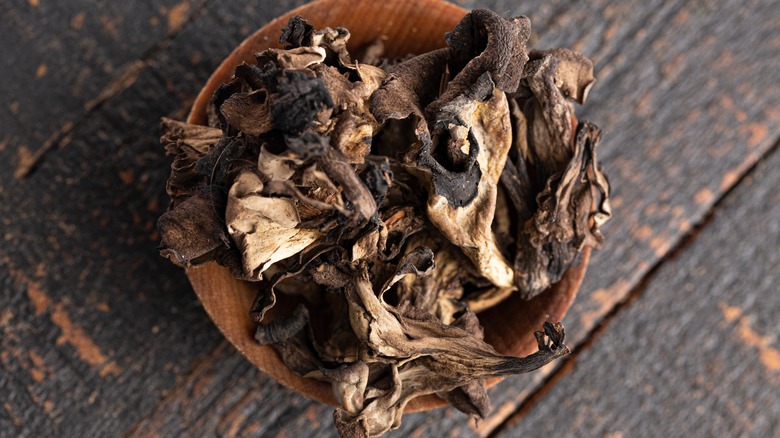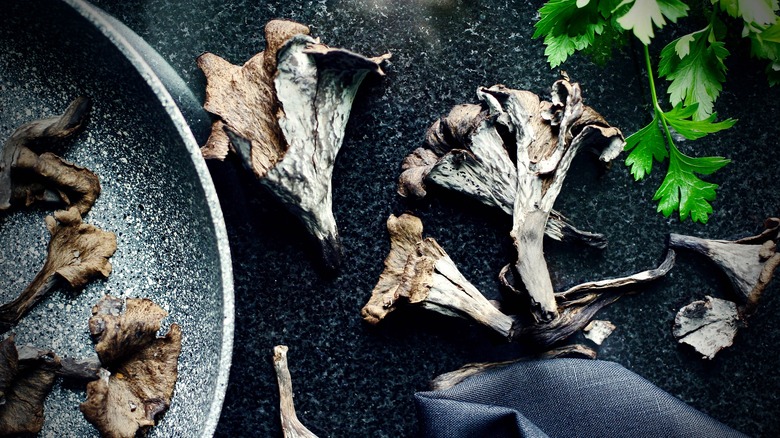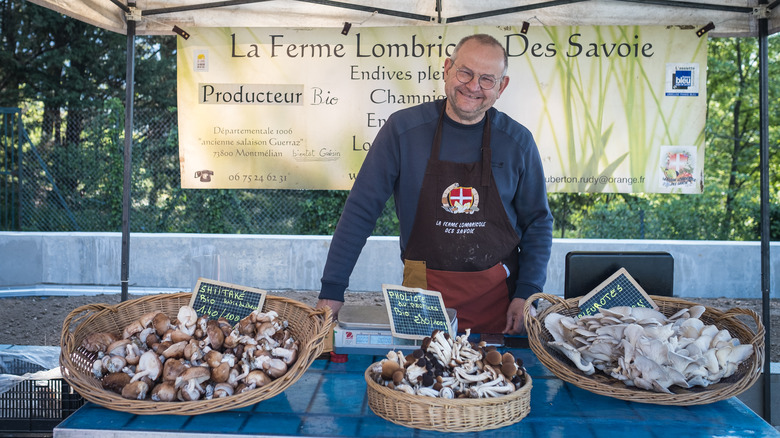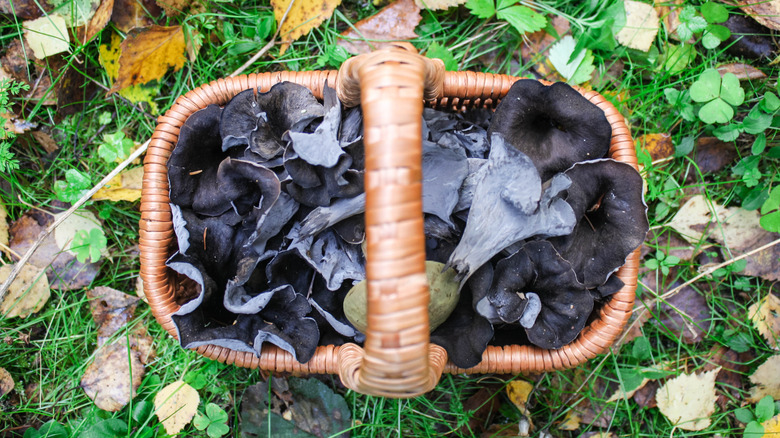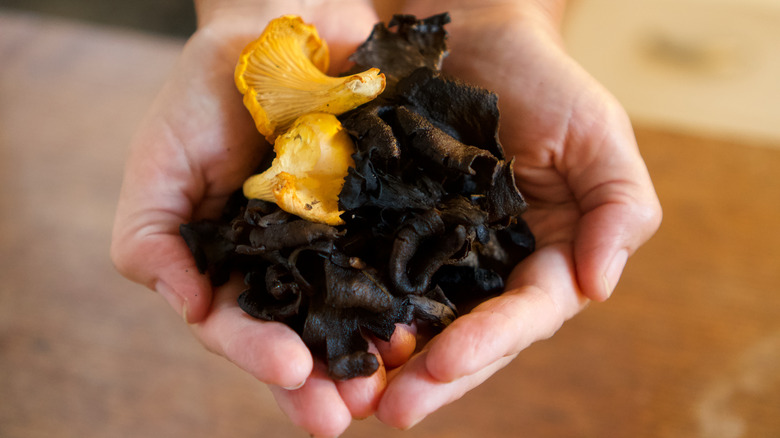The Mushroom Substitute For Less Expensive Black Truffle Flavor
Even if you may have never tasted one and you're into food, you've more than likely heard about black truffles and their affinity. With a high and hefty sticker price, depending on the season, black truffles are an ingredient reserved for the most lavish of celebratory meals. Or, for those who could never justify spending that type of money on a fungus (technically not even a mushroom), they're a luxury umami experience we've happily left to our own imaginations.
But that may not have to be the case any longer. Just like mushrooms are rumored to ease your stress and boost your immune system, one mushroom, in particular, could be a more affordable ticket to the black truffle lifestyle. The black trumpet, or Craterellus cornucopioides, has a flavor profile that's been described as rich and smoky, with notes of black truffle when dried. If you live in an area where they grow and enjoy a nice hike, you could get them for free — or purchase them from a local forager at the farmers market if that's more your vibe. Either way, you'll get to have the black truffle experience without the black truffle price.
What are black trumpet mushrooms?
Black trumpet mushrooms technically belong to two species depending on where they grow: the European dominant species, Craterellus cornucopioides, and the North American dominant species, Craterellus fallax. In Europe, they grow in France during the summer and fall, while they grow year-long on the West Coast of the United States. Outside of Northern California, however, they can also be spotted growing in the Midwest and East Coast from mid-summer to fall. The black trumpets are a mushroom of many names, and you can find them called anything from the Trumpet of Death to black chanterelles.
Ranging in color from brown and black to grey, black trumpet mushrooms grow from two to 15 centimeters in height and are exclusively in the wild. Besides their color, black trumpet mushrooms are identifiable by their fragile funnel-shaped stems. Without caps, the tops of black trumpets curl away outwardly, with wavy flower petal-like edges similar to chanterelles with smooth, suede-like skin.
Unlike portobellos, black trumpet mushrooms have no gills. However, they do seem to prefer wet, moist areas. They grow along with red and white oak trees but are also less commonly found accompanying pines. Besides being genuinely wild mushrooms, black trumpets are truly delicious — packing some of the most intense flavors you may not get in any other mushroom.
What do black trumpet mushrooms taste like?
In the mushroom department, black trumpets are one of the most pungent, both in their aroma and flavor. Besides their color and shape, the black trumpet mushrooms' smell is one of the ways that foragers can distinguish them in the wild. Described as strong, sweet, and woodsy, black trumpets are an excellent example of how much our sense of smell affects our taste. These small mushrooms pack a bite; they're rich, nutty, smoky, and sweet — a combination of complex flavors that can only be described as umami.
Black trumpet mushrooms are hollow and have a unique texture that is soft and chewy. This can be slightly altered if your black trumpet mushrooms are dried. Typically meatier in texture than the fresh, dried black trumpet mushrooms carry a much more pronounced flavor. That's because the drying process breaks down the mushroom's complex proteins into simpler amino acids and boosts their natural sodium, giving them a taste so umami that it can be compared to black truffles. But that type of flavor isn't for the heavy-handed and should be used with the utmost caution.
Black trumpet mushrooms vs. black truffles
It's no secret that truffles are expensive, and with black trumpet mushrooms selling for as little as $30-40 per pound fresh and $8-15 per ounce dried, the first major differentiator (besides the obvious fact that one is a mushroom and the other not) between black trumpet mushrooms and black truffles is the price. While black truffles may be considered the less expensive of the truffles, they can still cost you as much as $2000 per pound depending on the season — making black trumpet mushrooms the clear winner for your bank account. But what about your kitchen?
Dried black trumpet mushrooms are often compared to black truffles because of their incredibly unique flavor. While the potency and flavor of fresh, high-quality black truffles are nearly impossible to match, black trumpets — especially dried black trumpets — do an impressive job. Still, if you're an experienced truffle taster, you won't find the same level of richness from black trumpets. But, considering the price difference, it may be excusable.
Cooking with black trumpet mushrooms
Despite having one of the most potent flavors, cooking with black trumpets isn't much different than cooking with other types of mushrooms. In fact, black trumpet mushrooms are preferred by chefs because they tend to be very clean and require very little trimming. But they're also favored for their delicate texture and smoky flavor that's often used as a substitute for black truffles.
They work well sautéed, fried, or baked; just note that because they're hollow, they will shrink in size. The black trumpet's flavors can be a bit finicky to work with — too much of it, and your dish could come out overly bitter, but not enough, and it can be easily overpowered. For this reason, black trumpets are best used with a light hand.
Another tricky aspect of cooking with black trumpets is their shelf life. Picked fresh, black trumpet mushrooms are only good for up to a week in the refrigerator, depending on if they are properly stored. For this reason, they're often sold dried. While you may miss out on their fresh, delicate texture, dried black trumpet mushrooms are distinctly smoky, with rich and earthy notes even more similar to those of black truffles, with much longer shelf life. Dried black trumpet mushrooms can be ground into a powder and used as a seasoning on vegetables, meat, sauces, and soups. But they can also be rehydrated like any other mushroom by covering them in a warm liquid or stock.
Swapping black trumpet mushrooms for black truffles
While black truffles are often used raw or slightly warmed, shaved over a dish as a garnish, black trumpet mushrooms don't quite work that way. Even though they can be eaten raw, it's really only recommended with the younger, more tender mushrooms because black trumpets get tougher as they age. Also, even though they have a lot of similar flavor profiles to black truffles, they're more often dried to enhance their flavor, which is an essential step if you're using them as a substitute for black truffles. So be prepared for a longer preparation.
That being said, because black trumpet mushrooms have a similar flavor profile to truffles, they also go with many of the same dishes. Whether sautéed and tossed into a creamy pasta, dried and used as a seasoning for truffle fries, or used in a risotto or soup, black trumpets will serve well in almost anything you'd typically find truffles in. But, just like with truffles, be careful not to go overboard or underboard. You'll find that using a light hand will serve your dishes best, and sticking with lighter dishes won't overpower their flavor.
Where to buy black trumpet mushrooms
In the United States, black trumpet mushrooms grow on the West Coast, from northern California to Oregon, and all over the East Coast — although certain species can also be found in the Midwest. While they are available year-round in the West, they tend to hit peak season everywhere else in the summer and fall from July to as late as November. This would be fantastic news if black trumpets were grown commercially; however, being true wild-growing mushrooms, black trumpets are very difficult to cultivate domestically. Therefore, getting your hands on a batch could be more challenging than your everyday portobello.
In the right area and at the right time of year, black trumpet mushrooms can be found at your local co-op store or farmer's market. If you live somewhere between Northern California and Oregon, you could even find them at your regular grocery store. Otherwise, if you're living in the Midwest or East Coast, you'll more than likely only see them when they hit peak season. From the summer to late fall, your best bet will be getting them from the local farmers market. However, if you've utilized your resources and are still running dry, you might have to forage them yourself.
Foraging black trumpet mushrooms
Don't let the black trumpet's nicknames intimidate you. Also known as the Horn of Plenty, not only are black trumpets completely safe to eat, but they're actually one of the easiest mushrooms to forage. Without any lookalikes, there is a slim chance of you accidentally picking something poisonous by mistake.
Black trumpets grow around white and red oak trees, and some less common species grow with pines from mid-summer to fall. They can be challenging to spot due to their dark color; however, one trick to remember is that they tend to grow around yellowfoot chanterelles, which are golden yellow and very easy to spot from a distance. When you do spot some, you'll know that they're black trumpets because of their size and shape. Remember, aside from their funnel-shaped cap, black trumpets are distinguishable because they have no gills and a strong sweet yet woodsy aroma you can smell.
Nutritional information about black trumpet mushrooms
Nutritionally, black trumpet mushrooms have a lot of the same benefits that other mushrooms do. They contain a beneficial amount of fiber, protein, phosphorous, selenium, copper, and potassium, according to Harvard School of Public Health. However, while you can't always be sure that the domesticated mushrooms you find at the grocery store contain vitamin D, you can bet black trumpets do since they grow in the wild (via Monterey Mushrooms). Black trumpets are also unique to other mushrooms because of their vitamin B12 content, making them particularly beneficial for vegans and vegetarians.
Being mushrooms, black trumpets aren't excluded from all the magical abilities that other mushrooms are associated with. But, rather than the psychedelic effects that some varieties have, black trumpets contain other mystical mushroom powers that are more logically explained through science. Per Mushroom Health Guide, they have the potential use in stopping the growth of cancerous tumors and also have anti-inflammatory and antioxidant effects. Because of their high B12 content, this may help lead to better cognitive function and cell metabolism and lower the severity of intestinal issues.
